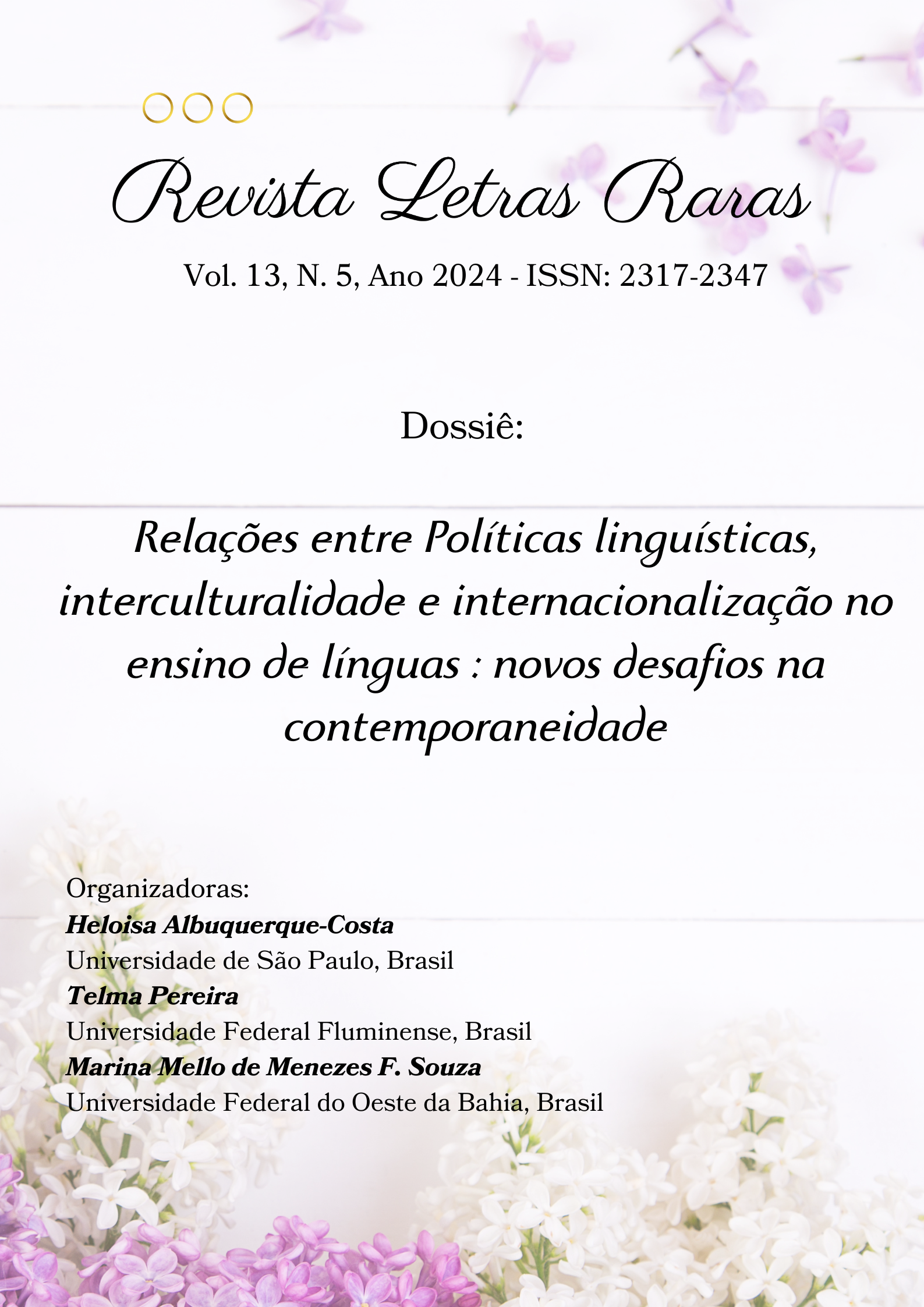Learning language or understanding culture? Discussions about the objectives of including the Chinese language in the state school of Rio de Janeiro
DOI:
https://doi.org/10.5281/zenodo.14562899Palavras-chave:
Language and culture, Chinese language teaching, Brazil-China Intercultural High School, Confucius InstituteResumo
In recent years, we have witnessed the expansion of Chinese language teaching not only in higher education institutions in Brazil with the establishment of Confucius Institutes, but also through the initiatives of several municipal and state governments that seek to offer the public a multilingual education. In the specific case of the state of Rio de Janeiro, the Joaquim Gomes de Sousa State Mathematics School – Intercultural Brazil-China was created in 2015, through a partnership between the State of Rio de Janeiro and the Hebei Normal University (China). Based on the documentary study and interviews, we intend to discuss how the high expectations of Chinese teachers regarding the linguistic proficiency of their students clash with the Brazilian reality, and how agents of the two nationalities negotiate and adapt to create more realistic objectives in relation to the teaching of Chinese language and culture within a state school. It is necessary not only to have a greater understanding between the two educational cultures, but also a joint effort between teachers, managers and formulators of linguistic and educational public policies to bring about a language-culture education that makes sense to students in the public school system in Brazil.
KEYWORDS: ; ;; .
Downloads
Referências
DUARTE D.M.; SANTOS K. M.; LIMA D.C. O professor frente aos dilemas da abordagem de aspectos culturais na aula de língua inglesa: a interculturalidade em discussão. Fólio – Revista de Letras, v. 3, n. 1, p. 295-308, janeiro/junho de 2011.
GALLI, J. A noção de intercultural e o ensino-aprendizagem de línguas estrangeiras no Brasil: representações e realidades do FLE. EntreLínguas, v. 1, n. 1, p. 111-129, janeiro/junho de 2015.
MENDES, E. O conceito de língua em perspectiva histórica: reflexos no ensino e na formação de professores de português. In. LOBO, T.; CARNEIRO, Z.; SOLEDADE, J.; ALMEIDA, A.; RIBEIRO, S. (orgs.) Rosae: linguística histórica, história das línguas e outras histórias [online]. Salvador: EDUFBA, p. 667-678, 2012.
___________. A ideia de cultura e sua atualidade para o ensino-aprendizagem de LE/L2. EntreLínguas, v. 1, n. 2, p. 203-221, julho/dezembro de 2015.
MEGALE, A. Por uma Educação Bilíngue inter/multicultural. In: MEGALE, A. (Orgs.). Educação Bilíngue no Brasil. São Paulo: Fundação Santillana, p. 73-86, 2019.
RIO DE JANEIRO. Resolução SEEDUC nº 5.330, de 10 set. de 2015. Fixa diretrizes para implantação das matrizes curriculares para a educação básica nas unidades escolares da rede pública. Rio de Janeiro, setembro de 2015.
_______________. Projeto Político Pedagógico do Colégio Estadual Matemático Joaquim Gomes de Sousa. Niterói, 2015.
_______________. Resolução SEEDUC nº 5.424, de 2 mai. de 2016. Estabelece o conceito para implementação do Programa de Educação Integral, no âmbito da Secretaria de Estado de Educação do Rio de Janeiro. Rio de Janeiro, maio de 2016.
_______________. Projeto Político Pedagógico do Colégio Estadual Matemático Joaquim Gomes de Sousa. Niterói, 2017.
_______________. Resolução SEEDUC nº 6035, de 28 de jan. de 2022. Fixa diretrizes para implantação das matrizes curriculares para a educação básica nas unidades escolares da rede pública e dá outras providências. Rio de Janeiro, janeiro de 2022.
RODRIGUES, F. C. Língua viva, letra morta. Obrigatoriedade e ensino de espanhol no arquivo jurídico e legislativo brasileiro. Tese de doutorado do Programa de pós-graduação em língua espanhola e literaturas espanhola e hispano-americana. 2010.
SCHNEIDER M. N. Abordagens de ensino e aprendizagem de línguas: comunicativa e intercultural. Revista Contingentia, v. 5, n. 1, p. 68-75, maio de 2010.
SCHEYERL, D.; BARROS, K.; SANTO D.O.E. A perspectiva intercultural para o ensino de línguas: propostas e desafios. Estudos Linguísticos e Literários, n. 50, p.145-174, julho/dezembro de 2014.
SHEN, Q. 沈骑. The value dilemma and the positioning of China's foreign language education policy in the era of Globalization 3.0. 全球化3.0时代中国外语教育政策的价值困局与定位.当代外语研究, n. 4, p. 26-31, 2017.
WU, Q. 吴茜. The cultural mission of foreign language education in China. 中国外语教育的文化使命. 湖北大学学报(哲学社会科学版), v. 40, n. 4, p. 125-128, 2013.
YAN, Qiaorong. O desenvolvimento do ensino de português na China: história, situação atual e novas tendências. In. YAN, Qiaorong; FLEIDE, Daniel Albuquerque (Org.). O ensino do português na China: parâmetros e perspectivas. Natal, RN: EDUFRN, p. 24-52, 2019.
ZHAO, Y. 赵耀. Analysis of multiple sources and flows of foreign language planning for basic education in China in the new era. 新时代中国基础教育外语语种规划的多源流分析.上海外国语大学, 2020.
ZHANG, S. 张珊. Cultural Awareness in Foreign Language Teaching in China. 中国外语教育的文化自觉. 外语教学, v. 38, n. 2, p. 7-11, 2017.
ZHANG, Y. Q. 张永泉. The relationship between "language and culture" and its significance for foreign language teaching – from the perspective of intercultural communication. “语言与文化”关系及其对外语教学的意义——以跨文化交际为视角. 辽宁教育行政学院学报, v. 38, n. 5, p. 28-33, 2021.
Downloads
Publicado
Como Citar
Edição
Seção
Licença
Copyright (c) 2024 Revista Letras Raras

Este trabalho está licenciado sob uma licença Creative Commons Attribution-NonCommercial 4.0 International License.







